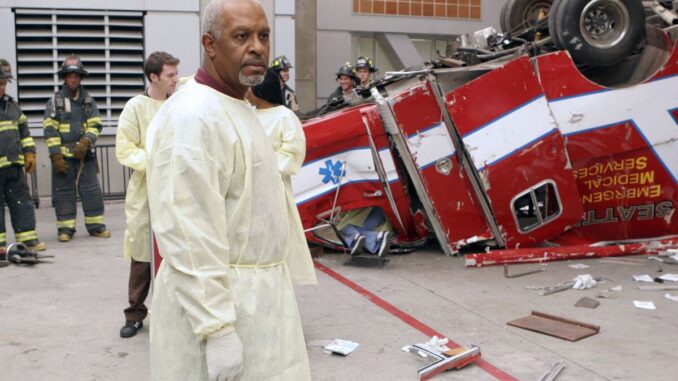
Finding Solace in the Unfolding Truth: Comfort in the Accident's Aftermath in Grey's Anatomy
Grey's Anatomy, a show known for its medical drama and complicated relationships, often finds its most compelling narratives in the face of tragedy. Accidents, a recurring motif throughout the series, are rarely isolated incidents; they become catalysts for self-discovery, forcing characters to confront their vulnerabilities and find solace in the raw, often brutal, truth that emerges in the aftermath. The "truth about the accident," whether it's a plane crash, a ferry disaster, or a car wreck, isn't just about the mechanics of the event, but about the emotional wreckage it leaves behind and the uncomfortable, yet ultimately comforting, truths that are revealed in its wake.
One of the most iconic examples of this is the infamous plane crash in season eight. The devastating event, which claims the life of Lexie Grey and leaves Mark Sloan critically injured, rips apart the surgical dream team and forces the survivors to grapple with a profound sense of loss and guilt. The immediate aftermath is defined by denial and trauma. Meredith, Cristina, Derek, Arizona, and Mark are stranded in the wilderness, forced to confront their mortality and the fragility of life. Yet, within this chaotic and painful setting, the truth begins to seep through.
For Meredith, the accident exposes her deep-seated fear of abandonment, a wound dating back to her tumultuous childhood. Seeing her sister, Lexie, die right before her eyes forces her to confront the fact that she cannot always protect the people she loves. This realization, while excruciating, becomes a source of strength. She acknowledges her vulnerability and allows herself to grieve openly, finding comfort in the shared pain with Derek and Cristina. It is in the brutal truth of Lexie's death, and the acknowledgement of the potential for losing everyone she cares about, that Meredith begins to truly embrace the present and cherishes the relationships she has.
Similarly, for Derek, the accident is a jarring reminder of the unpredictability of life. His injured hand, a surgeon's most valuable tool, is compromised, forcing him to confront the possibility of losing his identity. He initially lashes out, consumed by anger and frustration. However, through therapy and the unwavering support of Meredith, he slowly confronts the truth of his situation. He realizes that his worth isn't solely defined by his surgical skills. The accident allows him to appreciate the other aspects of his life – his family, his love for Meredith, and his contributions as a mentor. Comfort arrives not in the restoration of his surgical prowess, but in the acceptance of a modified future, one where his identity expands beyond the operating room.
Cristina, perhaps the most emotionally detached of the group, is profoundly affected by the trauma. The plane crash exacerbates her already present post-traumatic stress disorder, leaving her unable to function in a normal surgical setting. This highlights the truth about Cristina: her professional ambition, previously perceived as unwavering, is ultimately overshadowed by her human vulnerability. The accident forces her to confront the emotional toll of her demanding career. While she initially resists acknowledging her trauma, the accident ultimately pushes her to seek help and, eventually, to leave Seattle Grace for a new beginning in Switzerland, a decision that, while difficult, allows her to find a more sustainable path for her life. The comfort for Cristina lies not in burying the trauma, but in embracing the need for change and seeking a life that honors her emotional well-being.
Even the less directly affected characters find truth in the aftermath of the accident. Richard Webber, for example, initially blames himself for allowing the plane to take off. He grapples with guilt and the burden of leadership. However, through the ensuing investigations and the survivors' resilience, he eventually realizes that the accident was a tragic consequence of circumstances beyond his control. This acceptance, while painful, allows him to move forward and continue leading the hospital with renewed dedication. The truth that emerges for Richard is that leadership is about navigating uncertainty and supporting those affected by unavoidable tragedy.
In essence, Grey's Anatomy uses the "truth about the accident" as a magnifying glass, highlighting the raw and uncomfortable realities of the characters' lives. It's not always a comforting truth, but it is a necessary one. By confronting their vulnerabilities, their fears, and their flaws, the characters are able to find a deeper understanding of themselves and their relationships. They learn to appreciate the fragility of life, the importance of connection, and the enduring power of resilience. The comfort, therefore, is not in erasing the pain, but in finding strength and meaning in the face of tragedy, and in forging a path forward with a clearer understanding of themselves and the world around them. Ultimately, Grey's Anatomy suggests that the truth, however painful, is the foundation upon which healing and growth can truly begin.